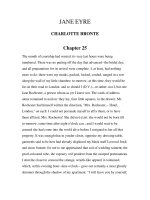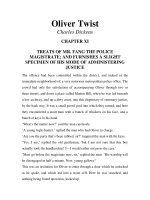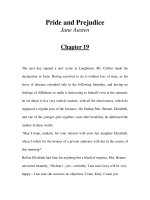LUYỆN ĐỌC TIẾNG ANH QUA TÁC PHẨM VĂN HỌC-JOURNEY TO THE CENTER OF THE EARTH -JULES VERNE- CHAPTER 1 docx
Bạn đang xem bản rút gọn của tài liệu. Xem và tải ngay bản đầy đủ của tài liệu tại đây (18.05 KB, 7 trang )
JOURNEY TO THE CENTER OF THE EARTH
JULES VERNE
CHAPTER 1
THE PROFESSOR AND HIS FAMILY
On the 24th of May, 1863, my uncle, Professor Liedenbrock, rushed into his
little house, No. 19 Königstrasse, one of the oldest streetsin the oldest
portion of the city of Hamburg.
Martha must have concluded that she was very much behindhand, for
thedinner had only just been put into the oven.
"Well, now," said I to myself, "if that most impatient of men is hungry, what
a disturbance he will make!"
"M. Liedenbrock so soon!" cried poor Martha in great alarm, halfopening
the dining-room door.
"Yes, Martha; but very likely the dinner is not half cooked, for itis not two
yet. Saint Michael's clock has only just struck half-pastone."
"Then why has the master come home so soon?"
"Perhaps he will tell us that himself."
"Here he is, Monsieur Axel; I will run and hide myself while youargue with
him."
And Martha retreated in safety into her own dominions.
I was left alone. But how was it possible for a man of my undecidedturn of
mind to argue successfully with so irascible a person as theProfessor? With
this persuasion I was hurrying away to my own littleretreat upstairs, when
the street door creaked upon its hinges; heavyfeet made the whole flight of
stairs to shake; and the master of thehouse, passing rapidly through the
dining-room, threw himself inhaste into his own sanctum.
But on his rapid way he had found time to fling his hazel stick intoa corner,
his rough broadbrim upon the table, and these few emphaticwords at his
nephew:
"Axel, follow me!"
I had scarcely had time to move when the Professor was again shoutingafter
me:
"What! not come yet?"
And I rushed into my redoubtable master's study.
Otto Liedenbrock had no mischief in him, I willingly allow that; butunless
he very considerably changes as he grows older, at the end hewill be a most
original character.
He was professor at the Johannæum, and was delivering a series oflectures
on mineralogy, in the course of every one of which he brokeinto a passion
once or twice at least. Not at all that he wasover-anxious about the
improvement of his class, or about the degreeof attention with which they
listened to him, or the success whichmight eventually crown his labours.
Such little matters of detailnever troubled him much. His teaching was as the
German philosophycalls it, 'subjective'; it was to benefit himself, not others.
He wasa learned egotist. He was a well of science, and the pulleys
workeduneasily when you wanted to draw anything out of it. In a word,
hewas a learned miser.
Germany has not a few professors of this sort.
To his misfortune, my uncle was not gifted with a sufficiently
rapidutterance; not, to be sure, when he was talking at home, butcertainly in
his public delivery; this is a want much to be deploredin a speaker. The fact
is, that during the course of his lectures atthe Johannæum, the Professor
often came to a complete standstill; hefought with wilful words that refused
to pass his struggling lips,such words as resist and distend the cheeks, and at
last break outinto the unasked-for shape of a round and most unscientific
oath:then his fury would gradually abate.
Now in mineralogy there are many half-Greek and half-Latin terms,very
hard to articulate, and which would be most trying to a poet'smeasures. I
don't wish to say a word against so respectable ascience, far be that from me.
True, in the august presence ofrhombohedral crystals, retinasphaltic resins,
gehlenites, Fassaites,molybdenites, tungstates of manganese, and titanite of
zirconium,why, the most facile of tongues may make a slip now and then.
It therefore happened that this venial fault of my uncle's came to bepretty
well understood in time, and an unfair advantage was taken ofit; the students
laid wait for him in dangerous places, and when hebegan to stumble, loud
was the laughter, which is not in good taste,not even in Germans. And if
there was always a full audience tohonour the Liedenbrock courses, I should
be sorry to conjecture howmany came to make merry at my uncle's expense.
Nevertheless my good uncle was a man of deep learning - a fact I ammost
anxious to assert and reassert. Sometimes he might irretrievablyinjure a
specimen by his too great ardour in handling it; but stillhe united the genius
of a true geologist with the keen eye of themineralogist. Armed with his
hammer, his steel pointer, his magneticneedles, his blowpipe, and his bottle
of nitric acid, he was apowerful man of science. He would refer any mineral
to its properplace among the six hundred [l] elementary substances now
enumerated,by its fracture, its appearance, its hardness, its fusibility,
itssonorousness, its smell, and its taste.
The name of Liedenbrock was honourably mentioned in colleges andlearned
societies. Humphry Davy, [2] Humboldt, Captain Sir JohnFranklin, General
Sabine, never failed to call upon him on their waythrough Hamburg.
Becquerel, Ebelman, Brewster, Dumas, Milne-Edwards,Saint-Claire-Deville
frequently consulted him upon the most difficultproblems in chemistry, a
science which was indebted to him forconsiderable discoveries, for in 1853
there had appeared at Leipzigan imposing folio by Otto Liedenbrock,
entitled, "A Treatise uponTranscendental Chemistry," with plates; a work,
however, which failedto cover its expenses.
To all these titles to honour let me add that my uncle was thecurator of the
museum of mineralogy formed by M. Struve, the Russianambassador; a
most valuable collection, the fame of which is European.
Such was the gentleman who addressed me in that impetuous manner.Fancy
a tall, spare man, of an iron constitution, and with a faircomplexion which
took off a good ten years from the fifty he must ownto. His restless eyes
were in incessant motion behind his full-sizedspectacles. His long, thin nose
was like a knife blade. Boys havebeen heard to remark that that organ was
magnetised and attractediron filings. But this was merely a mischievous
report; it had noattraction except for snuff, which it seemed to draw to itself
ingreat quantities.
When I have added, to complete my portrait, that my uncle walked
bymathematical strides of a yard and a half, and that in walking hekept his
fists firmly closed, a sure sign of an irritabletemperament, I think I shall
have said enough to disenchant any onewho should by mistake have coveted
much of his company.
He lived in his own little house in Königstrasse, a structure halfbrick and
half wood, with a gable cut into steps; it looked upon oneof those winding
canals which intersect each other in the middle ofthe ancient quarter of
Hamburg, and which the great fire of 1842 hadfortunately spared.
[1] Sixty-three. (Tr.)
[2] As Sir Humphry Davy died in 1829, the translator must be pardonedfor
pointing out here an anachronism, unless we are to assume thatthe learned
Professor's celebrity dawned in his earliest years. (Tr.)
It is true that the old house stood slightly off the perpendicular,and bulged
out a little towards the street; its roof sloped a littleto one side, like the cap
over the left ear of a Tugendbund student;its lines wanted accuracy; but after
all, it stood firm, thanks to anold elm which buttressed it in front, and which
often in spring sentits young sprays through the window panes.
My uncle was tolerably well off for a German professor. The house washis
own, and everything in it. The living contents were hisgod-daughter
Gräuben, a young Virlandaise of seventeen, Martha, andmyself. As his
nephew and an orphan, I became his laboratoryassistant.
I freely confess that I was exceedingly fond of geology and all itskindred
sciences; the blood of a mineralogist was in my veins, and inthe midst of my
specimens I was always happy.
In a word, a man might live happily enough in the little old house inthe
Königstrasse, in spite of the restless impatience of its master,for although he
was a little too excitable - he was very fond of me.But the man had no notion
how to wait; nature herself was too slowfor him. In April, after a had planted
in the terra-cotta potsoutside his window seedling plants of mignonette and
convolvulus, hewould go and give them a little pull by their leaves to make
themgrow faster. In dealing with such a strange individual there wasnothing
for it but prompt obedience. I therefore rushed after him.









